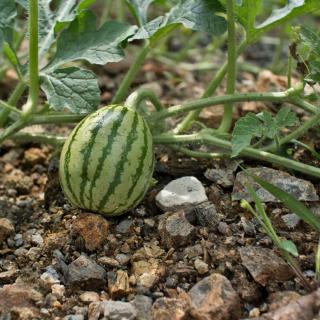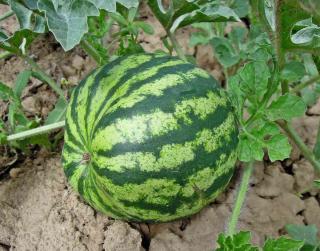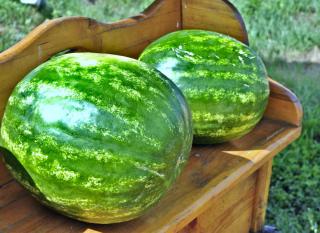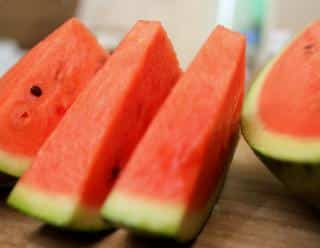

The king of summer fruits, watermelon is easy to grow if it can get enough sun.
Key watermelon facts
Name: Citrullus lanatus
Family: Cucurbitaceae (gourd family)
Type: fruit
Height: 8 to 20 inches (20 to 50 cm)
Exposure: full sun
Soil: rich (the more, the better)
Sowing/planting: spring – Harvest: July to October
From sowing to harvest, here is how to grow watermelon.
Watermelon needs a lot of heat to germinate well, because seedlings can’t cope with frost at all.
Since it needs warmth, it is best to grow it in regions nearer the Equator, or at least in a greenhouse if you’re far from it.
Seedlings can be prepared indoors in nursery pots, in a warm and well-lit room. The ideal temperature range is between 72°F and 75°F (22°C to 24°C).
Depending on the climate in your area, sowing watermelon is best starting from the month of March under cover in nursery pots followed by transplanting in May after any risk of freezing has disappeared, or you can also wait for May and proceed to sow directly in the plot.
If sowing in nursery pots, plant for more or less 3 weeks before transplanting them to the ground. That’s why there is no point in sowing too early.
It is also possible to sow directly in the ground starting from the month of May, if the area is prone to mild fall seasons.
This is the case in coastal areas such as climates nearer the Equator.
Since watermelon requires a lot of heat, it is recommended to place dark stones, shingles or tiles around the foot of the plant, they’ll store heat and share it to the plant.
 If you’ve got the space in your garden or vegetable patch, you don’t need to trim or prune your watermelon to get nice watermelons.
If you’ve got the space in your garden or vegetable patch, you don’t need to trim or prune your watermelon to get nice watermelons.
Only prune for maintenance if you’ve got to control its spread to keep it from turning invasive and running over other growth.
Watermelon needs a lot of water to develop well and grow fat, especially in case of heat and/or extended dry spell.
The watermelon harvest is starts about 30 days after the blooming and extends over several weeks.
You should observe the watermelon well, because it really isn’t easy to determine how ripe it is. Don’t wait for the watermelon to break off from the stem on its own (as you would for pumpkin or butternut), when this happens it’s usually already overripe.
 Best avoid watering during the last days before harvesting, and try to harvest in the afternoon instead of morning, so that the water content drops a bit.
Best avoid watering during the last days before harvesting, and try to harvest in the afternoon instead of morning, so that the water content drops a bit.
After having been harvested, the watermelon won’t ripen any more, and it will keep for a few days or weeks depending on how it is stored.
 The ideal preservation temperature ranges from 50° to 57°F (10°C to 13°C).
The ideal preservation temperature ranges from 50° to 57°F (10°C to 13°C).
Even though the watermelon won’t ripen anymore after it’s been picked, its color and taste keep getting better for about a week, if placed at room temperature.
 Native to Africa, watermelon is appreciated for its powerful thirst-quenching properties, as well as for its high vitamin content.
Native to Africa, watermelon is appreciated for its powerful thirst-quenching properties, as well as for its high vitamin content.
Just like melon, squash, pumpkins and other gourds, watermelon is part of the vast Cucurbitaceae family.
Watermelon is among the largest specimens of this family that brings together gourds and squash.
It is most often round, but can also be oval and record weight for a single watermelon is 65 pounds (30 kg)!
But most watermelons weigh between 2 and 6 pounds (1 to 3 kg).
It is known for the extremely high water content of its flesh (about 92%), which makes it one of the fruits that are the most loaded in water during the summer and is naturally very hydrating. Surprisingly, the seeds are where the vitamin C is found.
Watermelon is known to have powerful antioxidant activity.
The worst enemy of watermelon is cold temperatures: ensure it will never encounter them!